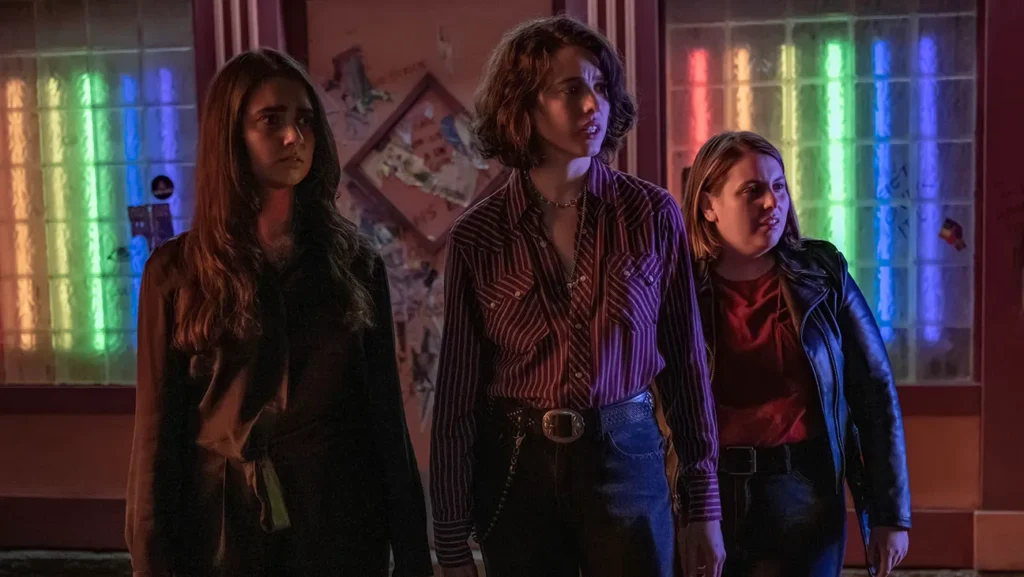Comedy, as they say, is hard—striking the target just right and knowing when to push a joke or let it speak for itself. If a movie comedy is constantly pushing, chances are the joke isn’t that funny to begin with. Such is Ethan Coen’s raucous lesbian buddy comedy Drive Away Dolls, about a pair of queer best gal pals pursued by a trio of inept mobsters during a sex-filled road trip from Pittsburgh to Tallahassee, which does a lot of pushing and is simultaneously funny and (often) unfunny. Too clever by half, it leans into an aggressive, everything-up-on-the-wall approach to getting laughs, generating both chuckles and eye-rolls, ever so slightly missing its mark.
Coen’s first solo directorial outing clearly aims to capture the giddy mania of Raising Arizona, absurdity of Burn After Reading and perhaps even a bit of Fargo’s deadpan criminality, but the expert calibration of each of those pictures—models of tone and performance in concert—has gone missing here, or has perhaps just been flung way over the top. Co-scripted by Coen and wife Tricia Cooke, who identifies as a lesbian, and originally intended as the opener of a lesbian B-movie trilogy, Drive Away Dolls has nothing if not gusto, and for a picture whose credits roll at the 77-minute mark it has energy that seldom flags.
Picture opens in Pittsburgh circa 1999 in the run up to Y2K (arbitrary, nary figuring into the plot), where we meet odd couple buddies Jamie (Margaret Qualley) and Marian (Geraldine Viswanathan). Good time girl Jamie is country transplant in the big city, enjoying sex-and-the-single-girl status after a split with police officer girlfriend Sukie (Beanie Feldstein), while Marian is a suited, uptight office drone whose idea of a fun night ends in bed with Henry James, or more precisely, The Europeans.

Marian is overdue to visit relatives in Tallahassee, so Jamie invites herself along, insisting the pair pick up a “drive-away”—a vehicle needing to be transported to an owner in another city—from proprietor Curlie (Bill Camp), who reluctantly signs over a nondescript Dodge Aries. But hidden in the car’s trunk (and figuring into the opening credit sequence featuring the ubiquitous Pedro Pascal) is a mysterious silver briefcase, the top secret contents of which were intended for delivery to a conservative, family values senator (Matt Damon) by a trio of bumbling operatives (Colman Domingo, Joey Slotnick, C.J. Wilson) now in hot pursuit.
Blissfully unaware of their precious cargo and despite Miriam’s insistence to drive a “straight line” all the way to the Sunshine State, the would-be Thelma and Louise nonetheless hit every dive motel and lesbian bar on the Eastern Seaboard, ingratiate their way into a collegiate women’s soccer team make-out slumber party, have a run in with the local police and even, sweetly, consummate their zany friendship.
But what’s in the mystery case? Nodding to both Robert Aldrich’s Kiss Me Deadly and Quentin Tarantino’s Pulp Fiction, the picture goes one better by revealing its contents—and it’s not what you would guess, by a long shot, but does get a few raunchy laughs. So do a handful of psychedelic, flashback interludes, which even manage to include a riff on cult groupie Cynthia “Plaster Caster,” if you get the drift.
The problem with Drive Away Dolls is that the humor is too often labored, as if a self-conscious, exaggerated in-joke. Qualley, the terrific new actress who is uniformly watchable, overshoots here with a sustained, SNL-level yokel commitment to caricature, which quickly grows strenuous. Feldstein, the talented Lady Bird and Hello Dolly! star, is dreadfully off-the-mark and plays one level—caustic bitterness—flatlining would-be jokes with a thud. Viswanathan is both likable and grounded, the straight man to the escalating farce, while Domingo (currently Oscar-nominated for Rustin), who played a comic criminal to ferociously good effect in 2020’s Zola, isn’t given enough to do. Both Slotnick and Wilson have their moments, but the payoff to their characters feels contrived in both suddenness and irony (of the sort handled much better in the Coens’ other films). Time and again Drive Away Dolls aims for broadness, such a scene of masturbation involving a massive dildo, which is unfunny and for its actress, borderline embarrassing.

Drive Away Dolls embraces a radical, in-your-face allegiance to queer movie dogma, the kind Greg Araki patented in unapologetic pictures like The Living End (1992), and the spirt of Bruce LaBruce in such outrageous gay exposés as No Skin Off My Ass (1991) and Hustler White (1996). Those pictures were boldly unconcerned with political correctness or commercial palatability, and for the most part the queer currents of Drive Away Dolls, which include gleeful girl-on-girl encounters and sexually riotous dialogue, are equally unfettered.
The difference? During they heydays of such groundbreaking gay filmmakers the world was a very different place for LGBTQ+ artists and viewers (Act up, fight back!), contextualizing films like those made by the likes of Araki, LaBruce, Bill Sherwood’s Parting Glances (1986), Gus Van Zant’s Mala Noche (1986) and My Own Private Idaho (1991), Todd Haynes’ Poison (1991), Rose Troche’s Go Fish (1994) and and certainly Almodovar’s unabashedly gay comic melodramas like Law of Desire (1987), as definitive outsider art; counterculture statements boldly pushing cultural boundaries during far less politically correct or welcoming times for their filmmakers and protagonists.
Drive-Away Dolls faces no such fringe dynamism in the high visibility, 2024 world of safe spaces, myriad identities and the mainstreaming of pronouns, sexual orientations and gender fluidity. The indie movie world that gave voice to its boundary-pushing predecessors has also dried up. What is perhaps most radical about Coen’s picture is that such formerly anarchist sentiments now appear front-and-center, driving a commercial film by a major filmmaker.
Let it not be said that Coen didn’t deliver an offbeat caper unafraid of significant horny pizzaz. Drive Away Dolls is fashioned as a would-be instant cult item, breaking the cardinal rule of a cult film (not intentionally endeavoring to make one). The movie is never quite as funny as it believes, and so airily inconsequential that it evaporates upon consideration. There are laughs, but of quantity rather than quality.
2 stars



